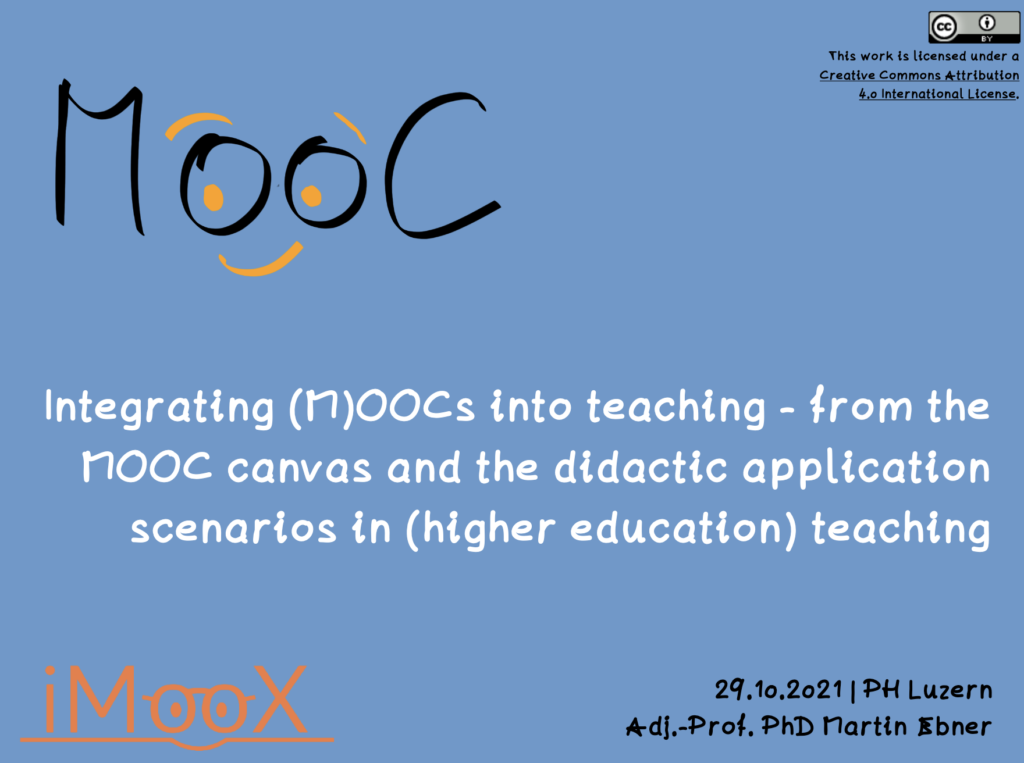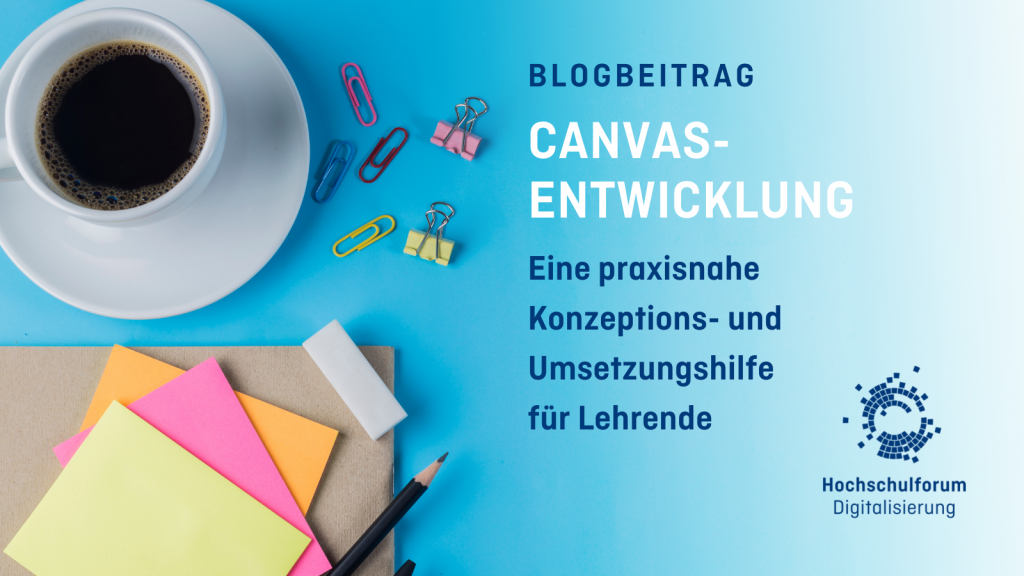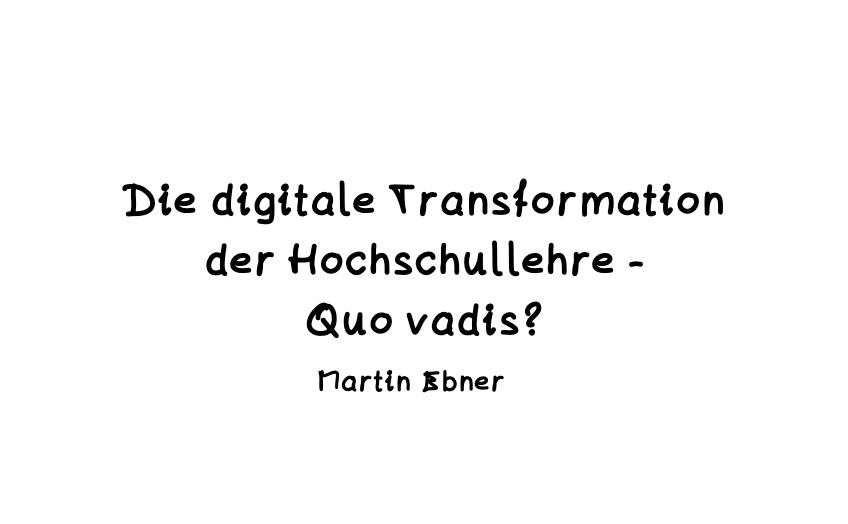I gave a short talk about MOOCs and their didactical use in Higher Education at PH Luzern a couple of months ago. Here are my slides:


Digitale Lehre an und rund um der Technischen Universität Graz
Veröffentlichungen zu jeweiligen Thema
Im Rahmen der AG „Quantifizierung der Hochschullehre“ haben wir uns in einer Untergruppe mit den rechtlichen Rahmenbedingungen der unterschiedlichen Hochschulen beschäftigt. Dieser Text ist nun auch in der Neue@Hochschulzeitung erschienen:
Zusammenfassung:
Das „Forum Neue Medien in der Lehre Austria“ untersucht aktuell das Thema „Quantifizierung von virtueller Lehre an österreichischen Hochschulen“. Im Folgenden werden die wesentlichen Ergebnisse der „Unterarbeitsgruppe Recht“ des genannten Forums dargestellt. Dabei wird geklärt, ob bzw. in welchem Umfang das Thema „virtuelle Lehre“ in den einschlägigen Hochschulgesetzen abgebildet ist.
Zitation: Ebner, M., Grün, E., Hauser, W., Karpf, K., Mantler, H., Niederl, F. (2022) Rechtliche Parameter zur „virtuellen Lehre“ im österreichischen Hochschul-Bereich. In: Neue@Hochschulzeitung, 2022 (1), S. 10-14 ISSN 2306-6059
Our publication about „Promoting Digital Skills for Austrian Employees through a MOOC: Results and Lessons Learned from Design and Implementation“ got published in the journal Education Sciences:
Abstract:
Digital skills are now essential, not only in information and communications technology (ICT) jobs, but for employees across all sectors. The aim of this article is to detail how employees’ digital skills can be fostered through a Massive Open Online Course (MOOC), how such an offer is used and what the effects of such a measure are. Using an approach oriented at action research and design-based research activities, the authors describe the basics of their finding on existing European competence frameworks for digital skills and European projects that used MOOCs, the development and design of the MOOC, the evaluation on the basis of learning analytics insights and a questionnaire, as well as a reflection. The MOOC was offered as Open Educational Resources (OER) on the Austrian MOOC platform iMOOX.at from March to April 2021, with 2083 participants, of whom 381 fully completed the course (at end of June 2021) and 489 filled out the final questionnaire
[full article @ ResearchGate]
[full article @ journal’s homepage]
Reference: Edelsbrunner S, Steiner K, Schön S, Ebner M, Leitner P. Promoting Digital Skills for Austrian Employees through a MOOC: Results and Lessons Learned from Design and Implementation. Education Sciences. 2022; 12(2):89. https://doi.org/10.3390/educsci12020089
 Issue 17(11) of our journal on emerging technologies for learning got published. Enjoy the readings as usual for free :-).
Issue 17(11) of our journal on emerging technologies for learning got published. Enjoy the readings as usual for free :-).
Table of Contents:
Nevertheless, if you are interested to become a reviewer for the journal, please just contact me 🙂 .
Wir haben in einem Beitrag für das E-Learning Handbuch unsere langjährige Erfahrungen zusammen geschrieben, um damit einen besseren Überblick über die Notwendigkeit von Learning Experience Design in Zusammenhang mit den Lehr- und Lernsystemen der Zukunft zu geben.
Zusammenfassung:
Learning Experience Design (LXD), also die bewusste, auf Grundlagen und Methoden der Designdisziplin erfolgten Gestaltung von Lernerfahrungen, ist ein Begriff der immer häufiger bei der Gestaltung von (digitalen) Lernumgebungen genannt wird. Zielsetzung ist dabei, das Lernen zu einer positiven, spannenden Erfahrung für die Lerner/innen zu machen. Dieser Beitrag beschreibt den Prozess des Learning Experience Designs im deutschsprachigen Raum und erläutert, wie sich diese Designdisziplin zur Gestaltung von Lernerfahrungen mit Lernenden anwenden lässt und nennt Bezüge zu Design im Allgemeinen, Learning Experience Design, Interaction Design, User Experience Design sowie Grafikdesign. Es werden dazu Fachbegriffe erläutert, Abläufe, Methoden und Verfahren zur Umsetzung, sowie zahlreiche Beispiele, u.a. aus unterschiedlichen Umsetzungen der Technischen Universität Graz (TU Graz) dargestellt. Der Beitrag schließt mit einer Beschreibung von Herausforderungen sowie einen Ausblick auf die aktuellen Professionalisierungsbestrebungen und -entwicklungen.
Referenz: Jacqueline Kircher, Eva-Maria Burger, Martin Ebner und Sandra Schön (2021). Learning Experience Design – zur Gestaltung von technologiegestützten Lernerfahrungen mit Methoden der Design-Entwicklung. In K. Wilbers & A. Hohenstein (Hrsg.), Handbuch E- Learning. Expertenwissen aus Wissenschaft und Praxis – Strategien, Instrumente, Fallstudien, 93. Erg.-Lfg. Oktober 2021, Beitrag 4.78.
Our chapter about „Quiz Feedback in Massive Open Online Courses from the Perspective of Learning Analytics: Role of First Quiz Attempts“ got published:
Abstract:
Massive open online course (MOOC) platforms within the so-called xMOOC framework typically host quizzes, sometimes as part of the course assessment. Within our contribution we look at and describe quizzes and their results as a feedback for learners. Additionally, we describe current research on quizzes in MOOCs, especially from a learning analytics perspective. Building upon this, we explore data from a single MOOC (N = 1,484) from the Austrian MOOC platform iMooX.at where quizzes are used for final assessment but can be repeated up to five times within the course. The analysis of quiz activities shows a moderate correlation (r = 0,2765, N = 957) of the very first attempt with the final MOOC success.
[full chapter @ book’s homepage]
[draft @ ResearchGate]
Reference: Schön S., Leitner P., Ebner M., Edelsbrunner S., Hohla K. (2022) Quiz Feedback in Massive Open Online Courses from the Perspective of Learning Analytics: Role of First Quiz Attempts. In: Auer M.E., Hortsch H., Michler O., Köhler T. (eds) Mobility for Smart Cities and Regional Development – Challenges for Higher Education. ICL 2021. Lecture Notes in Networks and Systems, vol 389. Springer, Cham. https://doi.org/10.1007/978-3-030-93904-5_94
Wir haben im Rahmen eines Blogbeitrags für das Hochschulforum Digitalisierung kurz die Entwicklung eines Canvas reflektiert, welcher natürlich gerne auch von anderen Hochschulen verwendet werden kann:
An der Technischen Universität Graz (TU Graz) werden in Beratungsgesprächen mit Lehrenden zur Planung und Verbesserung von Lehrveranstaltungen und MOOCs immer wieder sogenannte „Canvasse“, also leere Vorlagen zur kreativen Gestaltung, eingesetzt. Mittlerweile hat die Organisationseinheit Lehr- und Lerntechnologien mehrere verschiedene Canvasse kreiert und teilweise neugestaltet oder neu aufgelegt. Aus der Erstellung und Überarbeitung der Canvasse sowie aus dem Feedback derjenigen, die die Canvasse benutzt haben, konnten Sarah Edelsbrunner, Jasmin Schauer und Sandra Schön einige „Lessons Learned“ im Bereich des Learning Experience Design mitnehmen. Diese teilen sie in diesem Blogbeitrag mit anderen Interessierten, die ebenfalls planen, einen Canvas zu erstellen oder einen bereits bestehenden, offen lizenzierten Canvas für die eigene Hochschule oder das eigene Projekt abzuändern.

 Issue 17(10) of our journal on emerging technologies for learning got published. Enjoy the readings as usual for free :-).
Issue 17(10) of our journal on emerging technologies for learning got published. Enjoy the readings as usual for free :-).
Table of Contents:
Nevertheless, if you are interested to become a reviewer for the journal, please just contact me 🙂 .
Ich bin eingeladen worden beim 16. Netzwerk-Treffen der Hochschulforschung Österreich rund um die digitale Hochschullehre einen Impuls zu geben. Herausgekommen ist ein Vortrag zur digitalen Transformation und eine versuchte Darstellung was es eigentlich so schwierig macht, nämlich die Hochschullehre unter höchster Qualität gut in die nächsten Jahre zu bringen:
